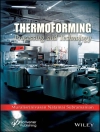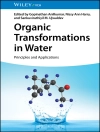Filling the gap for an overview text in this emerging field, this book gives an excellent summary and describes concepts, synthetic strategies, characterization and applications.
A certain emphasis is placed on metallo-supramolecular polymers, while such applications as self-healing materials, opto-electronics, sensing and catalysis are equally included.
Uniformly written by a highly renowned, international author team.
Table des matières
Supramolecular Polymers: General Considerations
Supramolecular Assemblies Based on Ionic Interactions
Supramolecular Polymers, Based on Hydrogen-Bonding Interactions
Supramolecular Polymers, Based on Metal-to-Ligand Interactions
Supramolecular Polymers, Based on p-Electronic Interactions
Supramolecular Polymers, Based on Crown-ether Recognition
Supramolecular Polymers Based on Cucurbiturils
Supramolecular Polymers, Based on the Host-Guest Chemistry of Calixarenes
Cyclodextrins in the Field of Supramolecular Polymers
Supramolecular Polymers, Based on the Host-Guest Chemistry of Pillarenes
Supramolecular Polymers, Formed by Orthogonal Non-covalent Interactions
Characterization of Supramolecular Polymers
A propos de l’auteur
Ulrich S. Schubert was born in Tübingen (Germany) in 1969. He studied chemistry in Frankfurt and Bayreuth (both Germany) and at the Virginia Commonwealth University, Richmond (USA). His Ph.D. studies were performed at the Universities of Bayreuth and South Florida. After a postdoctoral training with J.-M. Lehn at the University of Strasbourg (France), he moved to the TU Munich (Germany) and obtained his Habilitation in 1999. During 1999-2000, he was Professor at the University of Munich and during 2000-2007 Full-Professor at the TU Eindhoven (the Netherlands). Since 2007, he is Full-Professor at the Friedrich Schiller University Jena, Germany. Prof. Schubert is founder and director of the Jena Center for Soft Matter (JCSM) and the Center for Energy and Environmental Chemistry Jena (CEEC Jena). He received a VICI award of the Netherlands Organization for Scientific Research (NWO) and is Fellow of the ACS Division of Polymer Chemistry, Polymer Division (USA), the Royal Society of Chemistry (FRSC, UK), and the National Academy of Inventors (NAI, USA). Prof. Schubert is Elected Member of the German National Academy of Science and Engineering (acatech) and External Scientific Member of the Max Planck Society (MPI for Colloid & Interfaces, Golm). He has currently an h-Index of 107 and since 2016 is listed as ISI ‘Highly cited researcher’.
Andreas Winter was born in Herne (Germany) and studied chemistry at the University of Dortmund (Germany) where he graduated in organic chemistry in 1999. In 2003 he received his Ph.D. in chemistry (University of Paderborn, Germany) for work on applications of the Mannich reaction in the synthesis of pyridine derivatives under supervision of Professor N. Risch, and stayed on as a postdoc. Subsequently, in 2005 he joined the group of Prof. U. S. Schubert (Eindhoven University of Technology, The Netherlands and Friedrich-Schiller University Jena, Germany). His research is focused on the synthesis of emissive and luminescent metallo-supramolecular assemblies.
George R. Newkome received his B.S. and Ph.D. in chemistry from Kent State University. He joined Louisiana State University in 1968, becoming a full professor in 1978 and Distinguished Research Master in 1982. In 1986, he moved to the University of South Florida as Vice President for Research and Professor of Chemistry, becoming a Distinguished Research Professor in 1992. In 2001, he was appointed as Oelschlager Professor of Science and Technology at the University of Akron, where he is also Professor of Polymer Science and Chemistry, Vice President for Research, Dean of the Graduate School, and President of the University’s Research Foundation. He has published over 450 papers as well as 50+ U. S. patents, 9 books, and 16 edited books and journals. His research is focused on supramacromolecular chemistry, molecular dendritic and fractal assemblies, nanochemistry, inorganic-organic interfaces, molecular inclusion chemistry, molecular electronics, and photonics.












